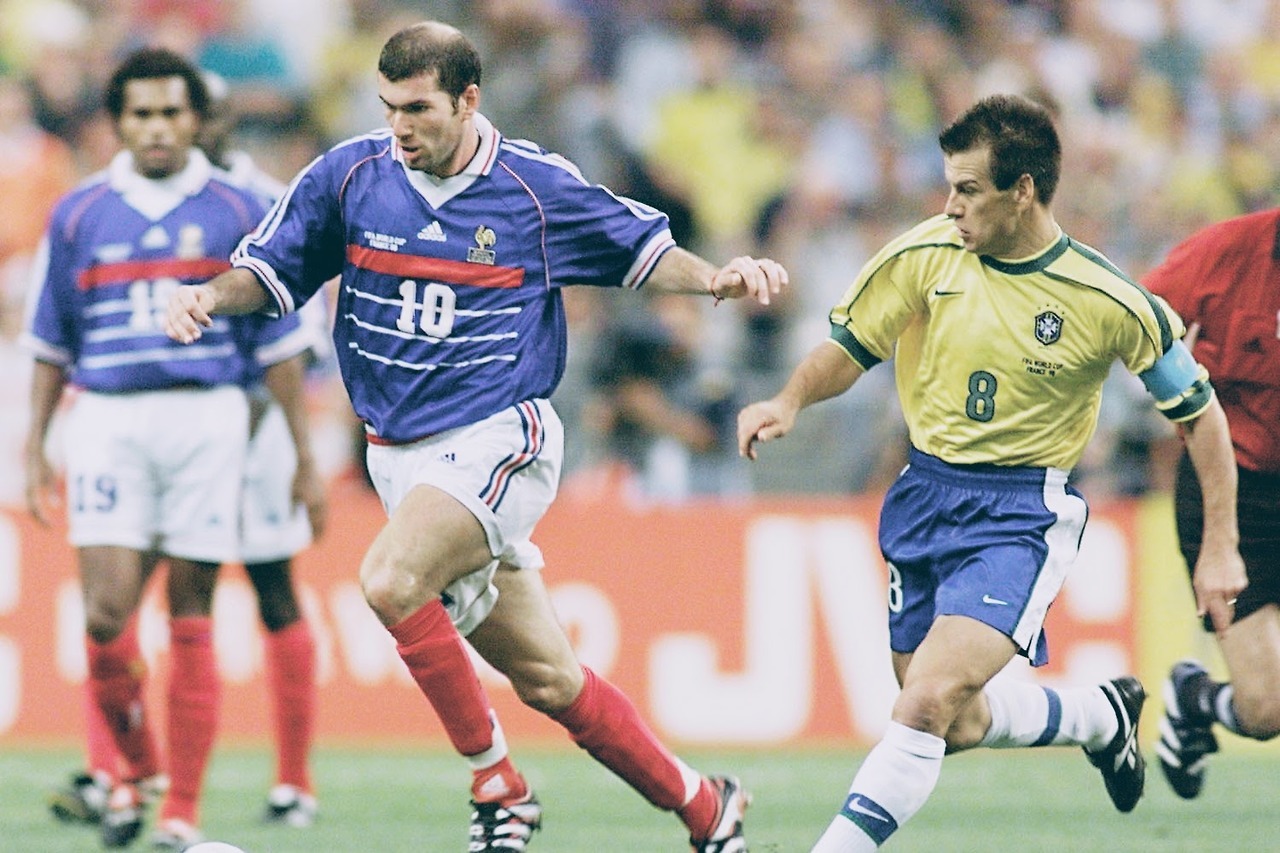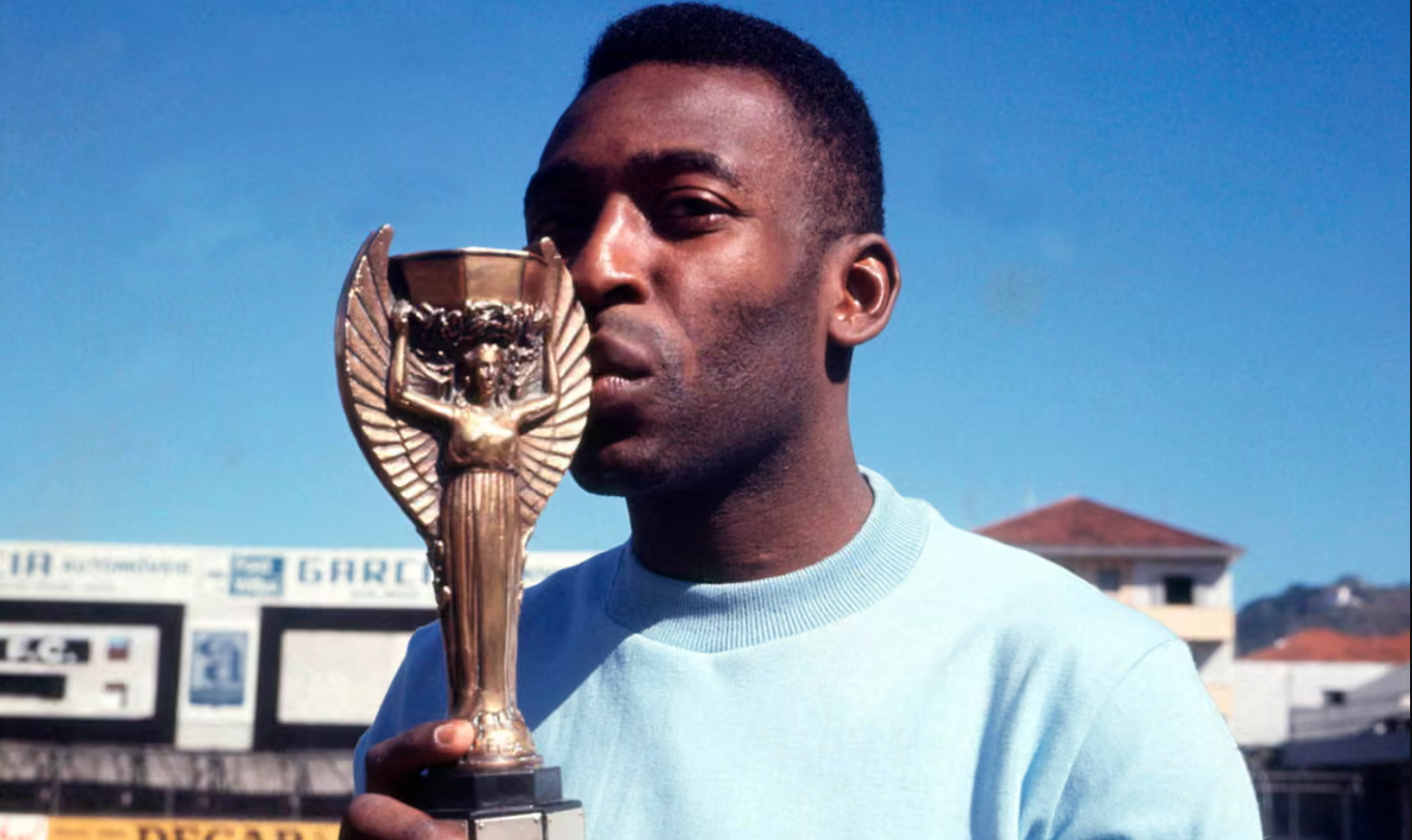
Zinedine Zidane: The Man Who Stopped Brazil’s Dominance Twice
- Rashel Ahamed
- November 21, 2024
- Sports
- Fifa World cup, Final, France, Quarter Final, Ronaldinho, Ronaldo, World cup final, Zidane
- 0 Comments
Until 2014, the FIFA World Cup had been held 20 times, with Brazil claiming the title a record five times. However, there’s a widespread belief that Brazil could have secured two more trophies if not for one bald-headed magician: Zinedine Zidane. Twice, Zidane stood between Brazil and their dream, delivering two of the most iconic performances in World Cup history.
After winning the World Cup in 1970, Brazil experienced a long dry spell. Despite fielding legendary players like Zico and Socrates, they failed to reach the final for two decades. The drought finally ended in 1994 when Romário led Brazil to their fourth title. The victory heralded the rise of Brazil’s “golden generation,” a team brimming with talent. Although they lost the 1995 Copa América final to Uruguay in a penalty shootout, they rebounded by winning the 1997 Copa América and Confederations Cup, entering the 1998 World Cup as overwhelming favorites.
Brazil’s golden generation achieved a rare feat: reaching three consecutive World Cup finals (1994, 1998, and 2002). Only Germany had accomplished this before, from 1982 to 1990. However, Zidane’s brilliance in 1998 and 2006 cast a shadow over Brazil’s dominance, creating moments of heartbreak for the South American giants.
Zidane in The 1998 World Cup
Brazil, the defending champions, entered the tournament with high expectations. Despite Romário’s controversial exclusion due to injury, they boasted a formidable lineup featuring Cafu, Roberto Carlos, Rivaldo, and Ronaldo. Ronaldo, the tournament’s brightest star, had been tipped to break Just Fontaine’s record of 13 goals in a single World Cup. Although he didn’t achieve that feat, his four goals and three assists played a crucial role in Brazil’s march to the final.
In the group stage, Brazil lost to Norway in a surprising result. They easily defeated Chile 4-1 in the Round of 16 but faced challenges against Denmark in the quarter-finals. Denmark took an early lead in the second minute, but Brazil scored twice by the 27th minute to take control. Denmark equalized in the 50th minute, but Brazil secured the win with a decisive goal in the 60th minute.
In the semi-final, Brazil faced a tough challenge against the Netherlands, which boasted stars like Bergkamp, Kluivert, Overmars, Edgar Davids, and Frank de Boer. Ronaldo’s speed, playmaking, and dribbling terrorized the Dutch defense. He eventually scored from a Rivaldo cross, but the Dutch equalized through Kluivert in the 87th minute. The match went to penalties, where Brazil prevailed to secure their spot in the final.
On the other hand, host nation France, after the Platini era, had failed to qualify for the previous two World Cups. In this tournament, they introduced a new generation. They won all three group-stage matches, defeated Paraguay with a golden goal in the Round of 16, beat Italy in a penalty shootout in the quarter-finals, and overcame Croatia in the semi-finals with two goals from Lilian Thuram. Heading into the final, Brazil was the clear favorite, while France’s main advantage was being the host nation.

In the final, France’s strategy was to maintain a solid defense while counter-attacking. Early on, they created some good chances, but poor finishing from players like Petit and Guivarc’h kept the scoreline unchanged. Brazil also came close, with a Ronaldo cross and a Leonardo header being brilliantly saved by Barthez.
Then, Zidane struck. From a corner kick, Zidane, who started outside the penalty box, moved in unmarked and headed the ball into the net, beating Taffarel. Just before halftime, Guivarc’h wasted another golden opportunity with a weak shot saved by Taffarel.

In the second half, Zidane scored again from another corner, repeating his earlier header. Surprisingly, Zidane was known to be weak in aerial duels before this match.
After halftime, France shifted to a defensive strategy, while Brazil went on the offensive. Their efforts were in vain, with France’s defense holding strong. Adding to Brazil’s woes, Desailly received a second yellow card, reducing France to 10 men. Despite this, Brazil struggled to break through. Ronaldo’s mysterious pre-match health issues were also blamed for the team’s lackluster performance. In the dying minutes, Petit scored another goal on a counter-attack, sealing Brazil’s fate.
For his incredible performance, Zidane was named Man of the Match, cementing his legacy as a World Cup hero.

Zidane in 2006 World Cup
Ronaldo, Ronaldinho, Kaka, Robinho, Adriano, Cafu, Roberto Carlos, Juninho, Dida—just hearing these names feels dazzling, doesn’t it? Brazil’s 2006 World Cup squad was truly star-studded, capable of conquering the world. At the center of attention was Ronaldinho, a magician who had made history with Barcelona in the two seasons before. While he played well in the 2002 World Cup, he wasn’t the main star of that team. In 2006, however, he arrived not just as a key player but with the expectation that winning the tournament would place his name alongside Pelé and Maradona.

France, on the other hand, was a struggling team heading into the tournament. They barely qualified, thanks to Zidane and a few other senior players coming out of retirement. In the group stage, France looked unimpressive. They drew their first two matches against Switzerland and South Korea and narrowly won their last group match against Togo to scrape through as runners-up. In the Round of 16, they faced Spain, a team with a reputation for exiting early. Despite defeating Spain 3-1, France didn’t earn much recognition. Their real test came in the quarter-finals against Brazil.

Brazil entered the quarter-finals as tournament favorites, showing their dominance in the group stage by winning all three matches with seven goals scored and only one conceded. They cruised through the Round of 16 with a 3-0 win. In contrast, France’s journey had been shaky—they had only one win and two draws in the group stage, scoring three goals and conceding one. They improved slightly with a 3-1 win in the Round of 16, but their form was still seen as inferior to Brazil’s.
Despite all the odds favoring Brazil, the match took a surprising turn. Zidane delivered one of the greatest performances of his career. At 34 years old, Zidane’s brilliance outshone Brazil’s galaxy of stars. He toyed with the opposition—lifting the ball over Ronaldo’s head, dribbling past Kaka, and deceiving Cafu with ease. It was as if Zidane could do whatever he wanted on the field that day.

The decisive moment came in the 57th minute when Zidane’s free-kick found Thierry Henry, who scored the only goal of the match. Brazil never managed to recover. Zidane’s complete control over the game earned him the Man of the Match award. This match is considered one of the greatest in World Cup history.
Zidane: Brazil’s Nemesis
Many teams win the World Cup, and many players win the Best Player award. But only a handful of matches are remembered as some of the best in history. Zidane is one of the rare players with more than one iconic World Cup match.
Zinedine Zidane’s legacy is inseparably tied to his performances against Brazil. In 1998, he announced himself as a World Cup hero, and in 2006, he reaffirmed his status as one of the game’s legends. His ability to rise to the occasion, even against the greatest teams, remains a hallmark of his career.
As football fans look back on World Cup history, Zidane’s masterclasses against Brazil stand out as two of the most iconic performances. While Brazil boasts the most titles, Zidane ensured that two of their golden opportunities slipped away.
The World Cup is a stage for legends, and Zidane’s name is forever etched in its history.




